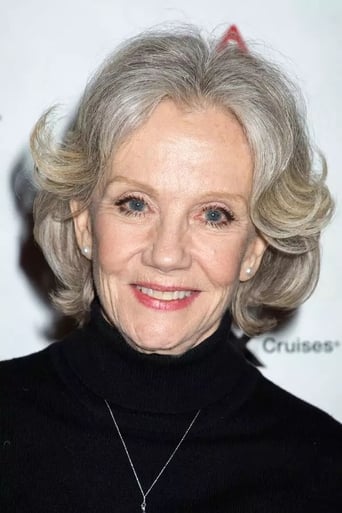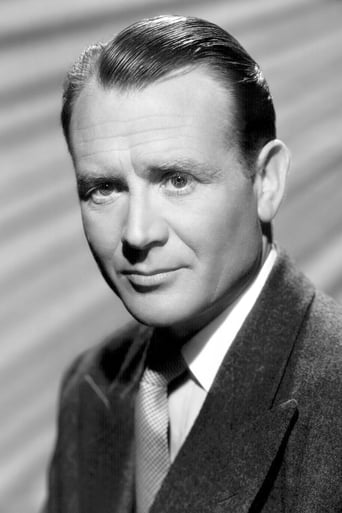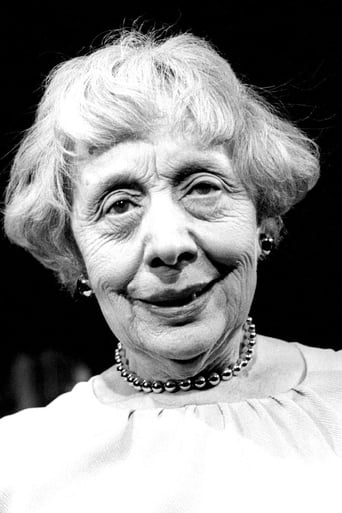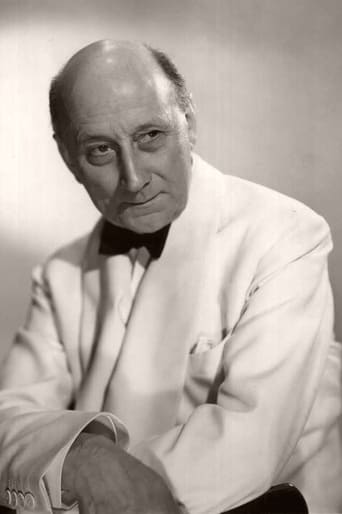Grimerlana
Plenty to Like, Plenty to Dislike
Pluskylang
Great Film overall
BoardChiri
Bad Acting and worse Bad Screenplay
Tobias Burrows
It's easily one of the freshest, sharpest and most enjoyable films of this year.
HotToastyRag
With all the mystery and psychological intrigue, The Chalk Garden could have been an Alfred Hitchcock movie! Deborah Kerr applies for a job as a governess to a very difficult young girl, Hayley Mills. Hayley's grandmother Edith Evans doesn't know how to handle her intense moods and pyromania, and Deborah Kerr instantly sees a kindred spirit in the lost little girl. Hayley makes it her mission to discover secrets about her new governess and to drive her away, and she tries to recruit the butler, John Mills, to join her mission. But with the tension crackling away, John doesn't want Deborah to leave! While Deborah Kerr and Hayley Mills give excellent performances enshrouded in deceit, mystery, and deep-seated pain, it's the scenes between father and daughter that steal the show. If you've seen the Millses in The Family Way, you know how sweet it is to watch them act together, and The Chalk Garden is no exception. While this isn't my favorite film, because I don't generally sympathize with emotionally disturbed children, I recognize that it's a well-acted film with a suspenseful story and that lots of other people might like it. Watch it with your mom and see what you think!
kijii
This psychological thriller was based on a very good play by Enid Bagnold, the author of National Velvet. Edith Evans was nominated for a Best Supporting Actress Oscar for her role as the grandmother, and John and Hayley Mills played opposite each other in one of their most effective interactions on screen. However, the best psychological jousting and interplay of the movie is that between the Hayley Mills and her new governess, played by Deborah Kerr.The movie is set on the steep chalky-white cliffs of Southern England where an elderly lady, Mrs. St. Maugham (Edith Evans), lives with her 16-year-old granddaughter, Laurel (Hayley Mills), after Laurel's mother had divorced her father and the father died. Mrs. St. Maugham is in the process of hiring a new governess, Miss Madrigal (Deborah Kerr), while fighting with her daughter, Olivia (Elizabeth Sellars), over legal custody of Laurel. In spite of giving no references, Miss Madrigal totally wins over Mrs. St. Maugham and is hired as Laurel's governess.The situation that Miss Madrigal walks into is very unconventional. The butler, Maitland (John Mills), is formal but far from non-observant or cold. Laurel is a cold-blooded, obnoxious brat who seems to have control of everyone around her and is tolerated, if not encouraged, for her precocious snobbishness. She enjoys shocking people and has Miss Madrigal in her sights as the next victim in a long line of governesses unable to control her. But, Madrigal is no pushover, and Laurel has her work cut out for her before getting rid of THIS governess.As the movie progresses, there is sort of a back-and-forth psychological game between Laurel's attempt to unearth something about Madrigal's past (so that she can get rid of her) and Madrigal's trying to learn more about Laurel's problems so she can help her. Laurel tries to play private detective by looking for incriminating evidence against Miss Madrigal. She notices that all of Madrigal's clothes (and her luggage) are new; that she has no visitors or phone calls; that she never writes or receives letters; and that she has no family photos to place on her dressing table. Laurel also notices that Miss Madrigal never locks her door for privacy until Maitland suggests it and buys a good padlock for her. Laurel's curiosity gets the best of her, and she breaks into Miss Madrigal's room to try to find something on her. But she fails.One evening in a conversation with Maitland, Miss Madrigal learns--or should I say confirms--that Laurel is a habitual liar: she learns this as she checks out several things that Laurel had told her. This seems to be troubling to her since she sees some of her own past in Laurel— something that shows Laurel's need to be loved and manifests this need by controlling people—keeping them away.Things come to a head when Mrs. St. Maugham's 'former mistress,' Judge McWhirrey, 'puppy' (Felix Aylmer), comes to visit the house before judging a murder case in London. While at the super table, Laurel, fascinated by true crime cases, asks him to describe, in detail, what a murder case is like. Real criminal cases are a passion that she and Maitland enjoy sharing. Judge McWhirrey's description is very upsetting to Miss Madrigal and eventually leads to the final outcome of the movie.While watching this movie, it is very easy to forget that John and Hayley Mills were a real-life father and daughter team. John puts up with Hayley's spoiled child role. At times, Hayley seems like she is overplaying her role, as she might have in a Disney movie, but there can be nothing subtle about Laurel, and she can't be played subtlety. In fact, she plays a child trying to pretend that she is an adult. The child side of her is captured in a couple scenes where she thinks she is not being watched: one with a childhood doll and another where she builds a sandcastle on the beach only to kick it over angrily when Miss Madrigal comes along to admire it. The scene on the steps (near the end of the movie) where Maitland and Laurel confront each other is powerful stuff and deserves nothing but kudos from the father-daughter acting duo. Overall, this is a good movie that deserves to be restored on DVD so that it can reach a wider audience.
Ruby Liang (ruby_fff)
Hayley Mills has always been one of my favorite teen actors since "The Parent Trap" circa 1961 with a fantastic Disney ensemble cast of Brian Keith and Maureen O'Hara as Susan & Sharon's parents, with unforgettable Una Merkel as Verbena, Joanna Barnes unmistakably as Vicky, and Leo G Carroll as the wistful Reverend Dr Mosby. "The Chalk Garden" 1964 is the rare occasion where Hayley got to truly deliver an in-depth performance involving complex emotions and character development. Playing opposite Deborah Kerr, Dame Edith Evans, and her father John Mills must had been a thrill for her.It seems they don't make simple straightforward drama delivered as stylish as the Ross Hunter Productions did. 'Straightforward' in the sense of no gimmick, no special effects - just simply excellent performances all round - a handful of characters weaving a meaningful, intriguing story. A believable set design and complementing art direction, skillful cinematography and right dose of music score applied. Directed by Ronald Naeme (who gave us "The Prime of Miss Jean Brodie" 1969 and blockbuster disaster hit "The Poseidon Adventure" circa 1972), you can say it's a perfect film experience, in spite of the 'damaged' teenager fighting for love and self-esteem subject. It was wonderful to see this film all over again, twice, thrice - well, there's no chapters option, the DVD simply plays and loops itself. (Hence the 'Vault Series' with no fanfare.) Guarantee deeper appreciation of this production and the performances with repeat viewing.I'm sure I'm not the only one who very much misses the other gem of a movie with Hayley Mills acting with her father John Mills again in the 1965 "The Truth About Spring" (directed by Richard Thorpe), a fun romp and buoyantly merry (sea adventure) with James MacArthur as Spring's (Hayley's character) opposite attraction. Sure hope a DVD revival version will soon sprout up! It IS a Universal Pictures - both production and distribution! Note: Notice Ronald Naeme was born in 1911. He'd be 100 next year in 2011. What an illustrious cinematic life in film-making achievements, and having been with the masters, Alfred Hitchcock and David Lean.
Noirdame79
Enid Bagnold's play, directed for the big screen by Ronald Neame in 1964, is a touching story about a mystery woman, Madrigal (Deborah Kerr) who answers an ad for a companion for a teenage girl. But this is no prim and proper young English lady - Laurel (Hayley Mills) is a troubled youth who resides with her wealthy grandmother (wonderfully portrayed by Dame Edith Evans, who plays a crusty aristocratic Briton like no one can), and who spins lies, sets fires and steals without a thought to consequences. Obsessed with murder and criminal cases, she is accustomed to having her own way, and sets out to expose her new governess as a madwoman or something worse. Despite the child's negative attitude, Kerr stays on, trying to reach out to Laurel, who in reality, feels so unloved and unworthy that her anger could get her into deep trouble later on. Miss Madrigal attempts to bring Laurel's mother, Olivia (Elizabeth Sellars) back into the picture, but this only adds to the tension within the household. Maitland (Sir John Mills), the butler, seems to have an uncanny understanding of all the goings on and a wry sense of humor that most likely keeps him from blowing a gasket.Laurel begins to unravel Madrigal's secret, which comes full circle when a distinguished judge and family friend comes for a visit. The realization of her conviction for murder (it is never really confirmed whether she was guilty of the crime or not), serves as a reason as to why she has been so determined to save Laurel - she fears that the girl will end up on the same path she did. Madrigal opens the eyes of all around her - "You should be frightened - you see before you the woman Laurel may yet become! The child who lied, cheated and hated, because she could not believe the simple fact that she was loved! You wanted the truth - and the truth may still save Laurel!" I cannot stress enough that the cast is uniformly excellent, bringing the film's message to the viewer's attention without bashing them on the head with it. Hayley and her late father act marvelously together, and Kerr embodies her role with such mystery, knowledge and concern that you never feel any malice for her, even after her past is revealed.An expressive musical score, lovely cinematography, both on location in England and at London's Pinewood Studios, as well as the intrigue surrounding Kerr's character make for a fantastically rich viewing experience.





